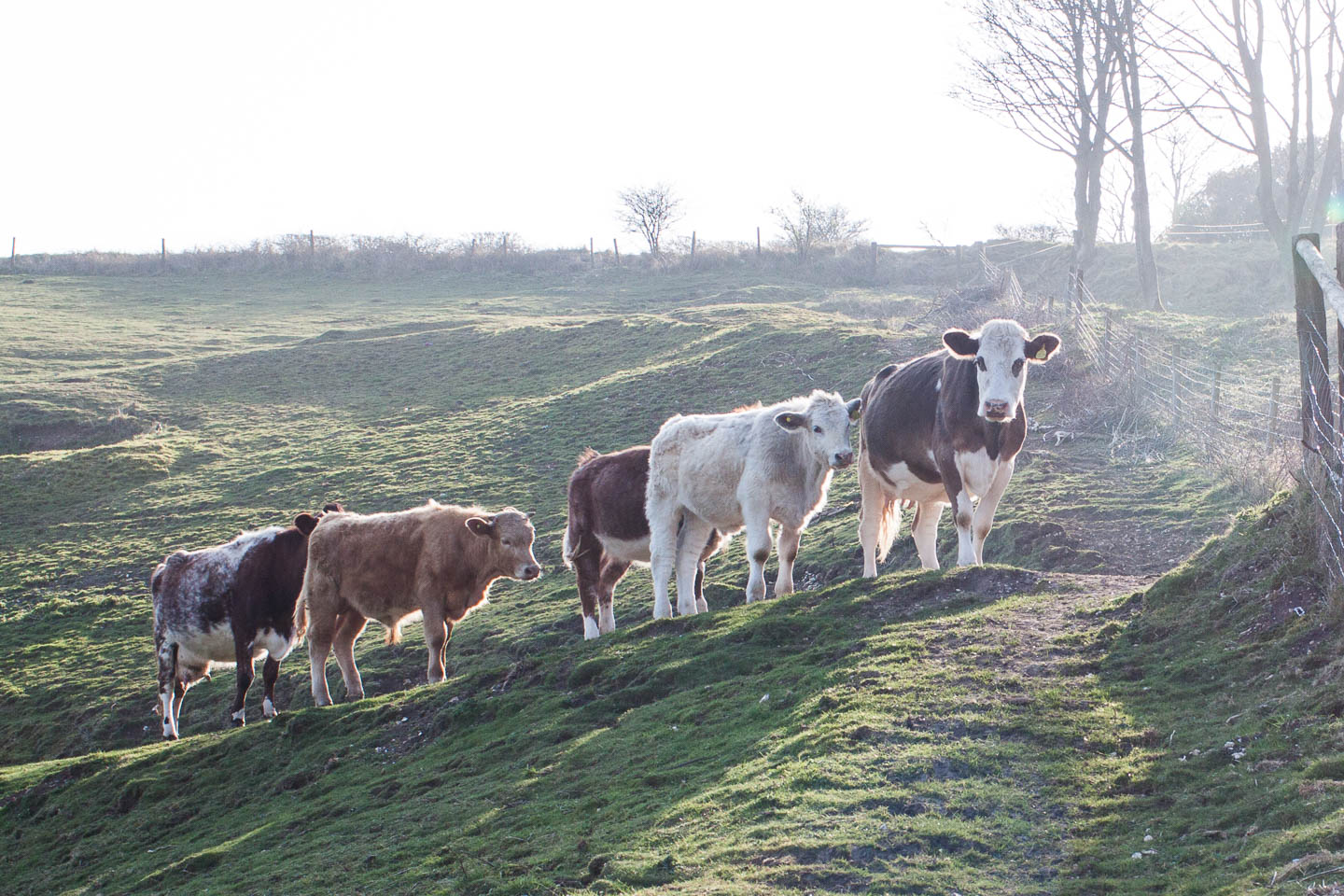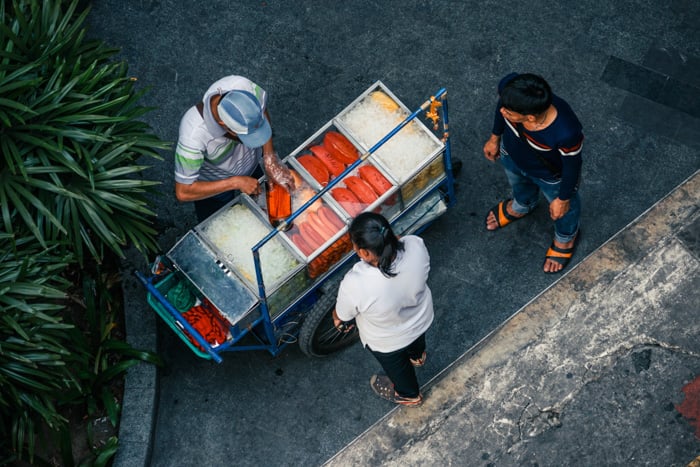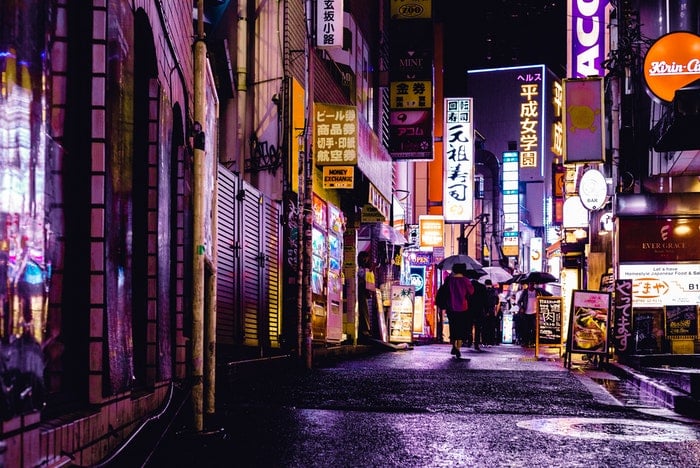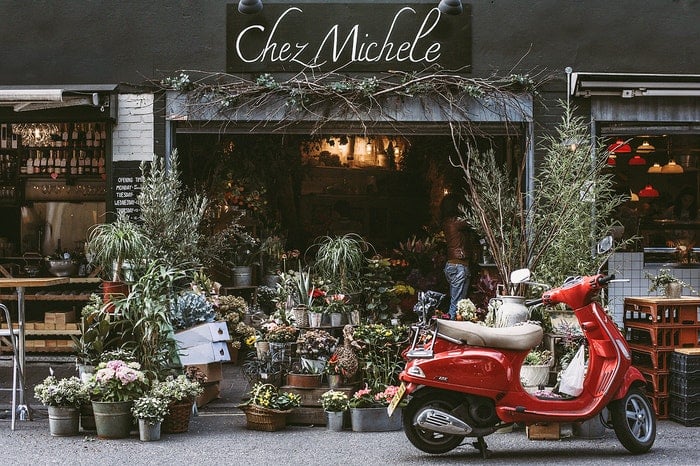Once you feel confident with your camera, creative street photography is an awesome subject to try. Especially if it’s in a community you’re familiar with.
You never know what you’re going to get when photographing candid street scenes. I love the buzz of capturing unintended magical moments. This buzz, and sharing the stories I photograph with others, is what keeps me motivated.
Our Top 20 Tips for Creative Street Photography
Check out these creative street photography tips and ideas. Then grab a camera and get out there!
1. Be Brave, Bold, and Friendly
Creative street photography is about confidence. There have been times when I’ve needed to explain to a stranger the reason I’m standing so close to their car is that I’m taking a photo of a scene. And right next to their car provides the best viewpoint.
I’m frequently asked, “What are you doing?” by curious strangers. Especially if I’m just sitting still for 10 minutes and holding my camera and staring into the distance.
The difference between an OK photo and a fantastic photo might just mean asking a builder if you can go onto a building site. Or talking to a parent about including their child in the frame. Be ready for conversations. And be confident with your street photography ideas and agenda. A smile and explanation go a long way.
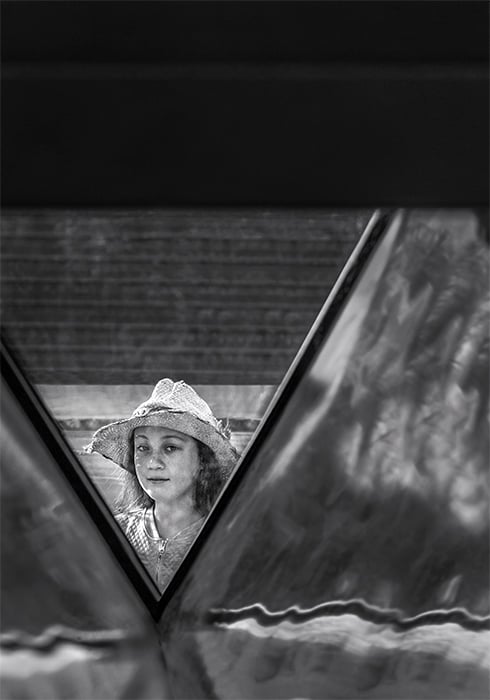
© Heather Milne
2. Creative Street Photography From Inside
As an avid coffee fan, this tip is important to me. Rest your legs by heading inside, ordering a hot beverage, and sitting by the window. What do you see outside?
This approach provides a very different perspective for creative street photography. Pedestrians are often oblivious to cafe windows. If you feel uncomfortable about photographing people‘s faces, be creative with your framing.
Photograph people walking away and groups of people. Or use a low aperture to capture details on the window with people in the background blurred.
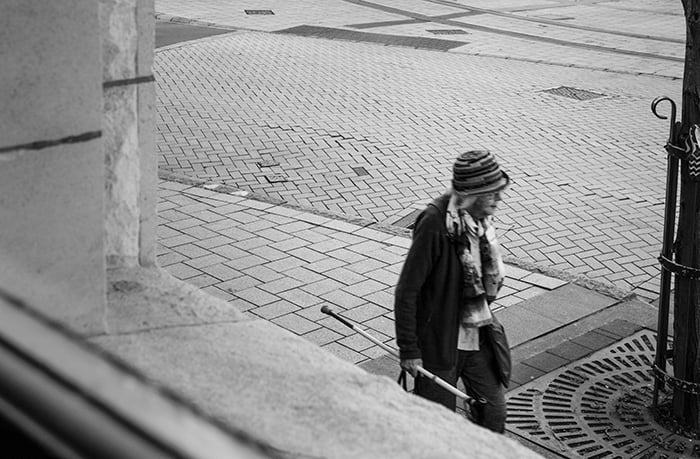
© Heather Milne
3. Be Creative With Only One Lens
You don’t need a ton of fancy lenses to get good creative street photography shots. Get disciplined with your craft by packing only one lens for the day. My favorite for this is a 50mm prime lens. It’s compact, unobtrusive, light, and provides sharp photos.
Only using one lens forces you to think carefully about what to include in your composition. And what to exclude from your frame! It also means less weight to carry around.
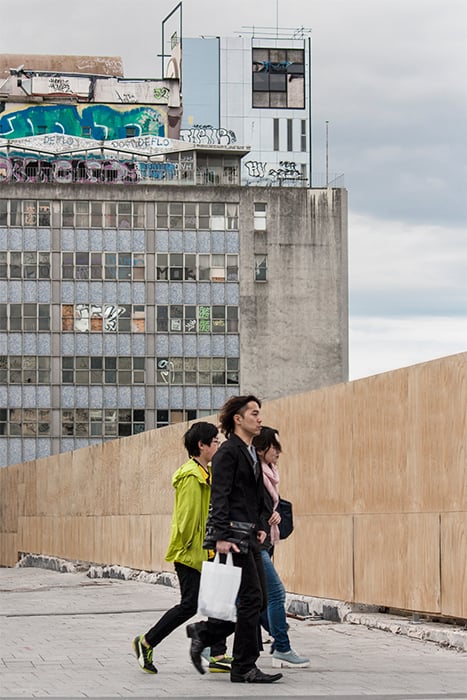
© Heather Milne
4. Shoot Into the Light
When you’re responding quickly to events unfolding, it’s not always easy to move to where the light is in the right place. Creative things happen on the street at all times of the day. Not just the golden hour when the light is perfect.
Windows reflect glaring sunlight and bright shop windows throw light onto the footpath. And sometimes it’s necessary to point the camera towards this light.
Learn how to photograph “contre-jour” (“against daylight”). And practice adjusting any haze and highlights in post-production. This creative photography technique can really help tell a story. And it will add a unique quality to your street photos.
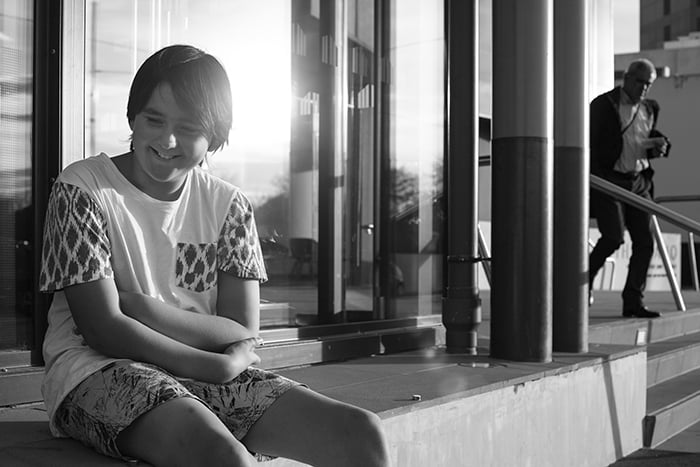
© Heather Milne
5. Act The Part
Some street photographers find it helpful to act while taking photos in order to get the shots they want. This avoids drawing too much attention to themselves or making the subjects uncomfortable. This can involve pretending to be distracted or interested in something else while surreptitiously taking the desired photo.
It’s important not to overdo the acting and to be respectful of people’s boundaries. One technique is to aim the camera at something else. Then quickly moving it to the intended subject and capturing the image.

6. Raise Your ISO
To capture fast-moving street scenes, it’s important to set your shutter speed to a fast setting. (Such as 1/250th of a second.) This will help ensure that your subjects are captured in sharp focus. A larger depth of field can also help minimize the risk of a missed focus ruining the photo.
Sometimes you’re in situations where there are multiple interesting subjects at different depths. Or there’s a great subject and background. A smaller aperture can help keep everything in focus.
All of these are great, but you’ll need to raise your ISO if you use a fast shutter speed or a smaller aperture.

7. Look For Relationships and Connections
Whether we’re aware of it or not, we’re constantly connecting with buildings, objects, other humans, and nature. Explore how the shapes of people on the street relate to the curves of trees and architecture. Or how people interact with traffic and intersections.
The proximity of people to each other can often tell an interesting story, and I’m always on the lookout for eye contact between strangers.
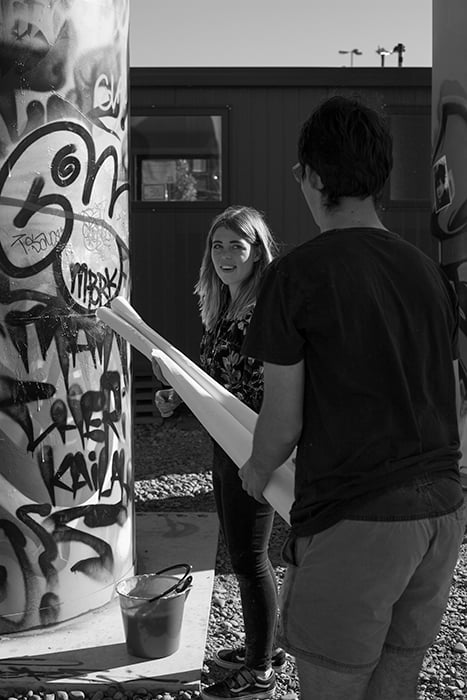
CHUZKOS artists installing a photographic street art exhibition. © Heather Milne
8. Animals and Creative Street Photography
Get some critters into your frame! Think about the insects, domestic pets, or wild animals in your community. They tell a lot about your environment and provide loads of opportunities for creative photography.
Animals provide an interesting contrast between manmade architecture and uninhibited nature. Photographing fast or unpredictable animals is also great practice for adjusting settings quickly!
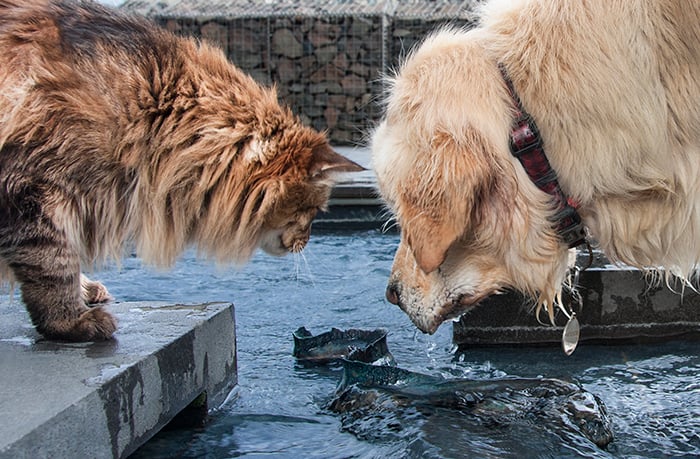
© Heather Milne
9. Seek Out the Unusual
The longer you spend photographing the streets and people, the more likely you are to develop a photographer’s intuition. You’ll sense when something unusual is about to happen. This translates to “extremely photogenic” in creative street photography terms!
Keep your street photography composition and settings simple and clear. Let the subject’s creativity speak in your photo. Look for flash mobs, buskers, parades, artwork, or an out-of-context object on the footpath. Things that are different draw the viewer in and encourage us to ask questions about the scene.
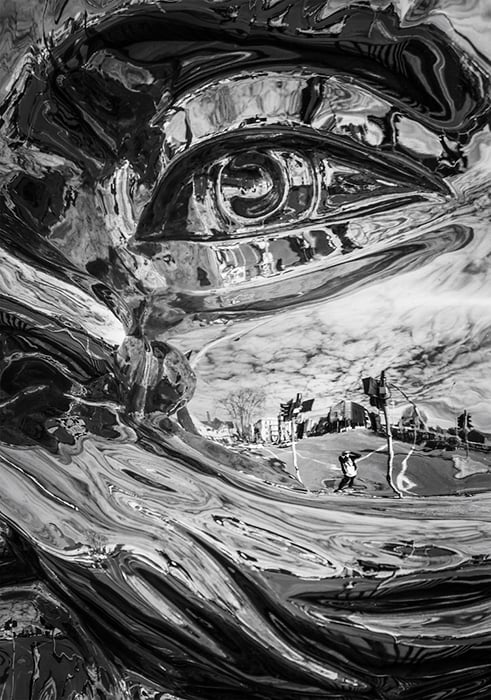
Photographer’s reflection in Reflective Lullaby (John) sculpture by Gregor Kregar. © Heather Milne
10. Photo Ideas for Smoke And Mirrors
Photographing smoke and reflections is a great way to enhance your creative street photography. Cigarette smoke and vehicle exhausts aren’t nice to smell. But they provide an interesting layer of haze to scenes, especially in cold weather. Steam rising from frosty surfaces in the sun or subway ventilation vents also has a similar effect.
If the air is clear and the sun is bright, try capturing repeating lines and shapes by turning your lens toward window reflections or puddles. Photographing a reflection on an angle to reflected surface will keep you out of the frame. (Unless you want to be there as part of your story!)
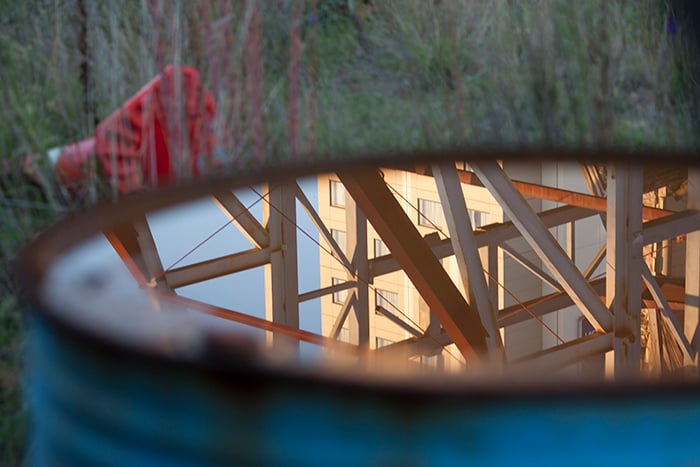
© Heather Milne
11. Use Your Phone Camera
Feeling a bit shy about pointing a camera around the streets? Try using the camera on your phone to practice composition and build confidence. We’re more accustomed to seeing people take photos with their phones than cameras. Use your phone and you won’t look out of place.
You’ll quickly learn how to respond to the movements around you. And how to experiment creatively with angles and framing. But you won’t have to worry about getting odd looks from people passing by.
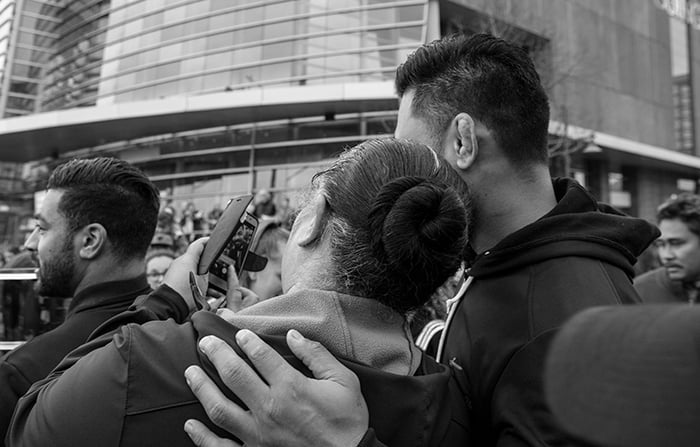
© Heather Milne
12. Go High And Low
Changing your angles is a simple and effective way to achieve more creative street photography. It’s also a great way to ease yourself into taking photographs in a public space.
Try sitting on the footpath and photograph what’s happening at ground level. Things like walking feet, bicycle wheels whizzing, strollers, and rolling wheelchairs.
Or you could stand on a staircase and get a great birds-eye view of what’s happening below. There are times to be in the middle of the action. But there are lots of options for capturing a powerful photograph from a different viewpoint.
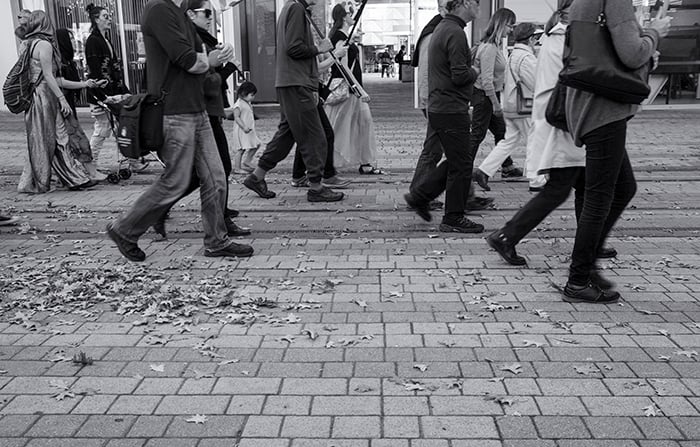
© Heather Milne
13. Find the Funny
Witty street scenes catch our eye and make us smile. I usually need to feel relaxed and well caffeinated to spot these moments. And often they’re at locations that I’ve walked past many times but didn’t pay close attention to.
Photograph people who are interacting with signage or street art. Or capture a person’s laugh for a beautifully human photograph. Look for ironic and clever placement of street features to tell the story.
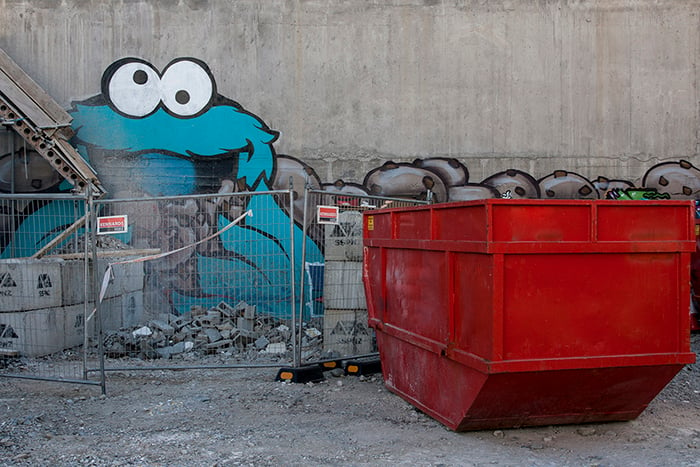
© Heather Milne
14. Let the Action Come To You
Street photography is about capturing candid moments. So it’s important to slow down and be more observant. By picking an area and waiting for things to come to you, you’ll be more perceptive and able to get better compositions.
This technique is especially helpful if you’re feeling uncomfortable with street and urban photography. It allows your subjects to enter your personal space rather than the other way around. You’ll also be in a better position to capture interesting moments as they happen.

15. Use Negative Space
I live in a city that was devastated by an earthquake. That means I’ve had plenty of opportunities to photograph negative space. Letting the eye “rest” by including big skies or plain walls in your photographs is a creative way to incorporate some emotion into your street photography. It can often evoke feelings of desolation, calm, or unease.
If you’re in a busy area, try tilting your camera upwards. Frame your composition to include a third of the chaotic street scene and two-thirds of the big sky or plain buildings. This might also be the moment you snap that bird flying past at the critical moment!
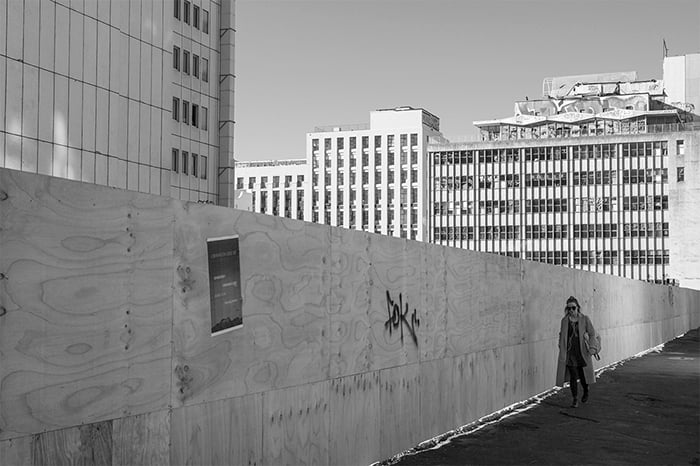
A city worker walks past an empty building site. © Heather Milne
16. Fill the Frame
In complete contrast to the previous photography tip, try filling your frame with many of things. I can sense my early photography tutors shuddering!
I love using this technique because it provides so much complex information for viewers to explore and interpret. One image can narrate multiple stories and document the moment in time in rich detail.
It’s also an easy and creative way to convey a sense of chaos, panic, or excitement.
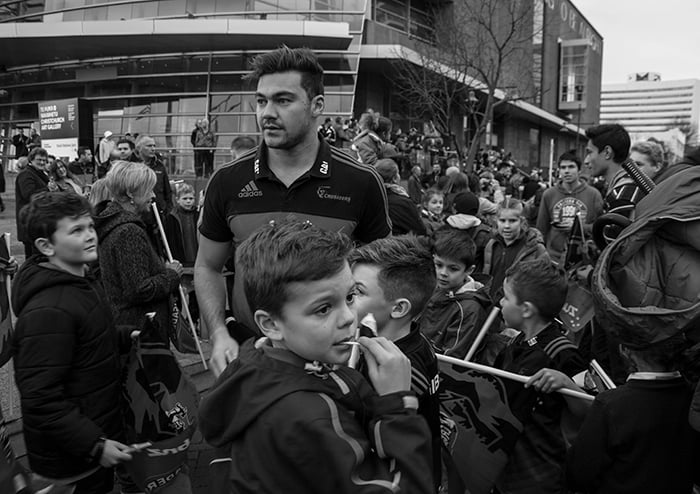
An adoring crowd with their winning rugby team. © Heather Milne
17. Shoot Creative Rubbish
Be inspired by ordinary and unsightly objects such as rubbish bins, graffiti, and old buildings. Keep your composition simple and experiment in Lightroom with adjusting colors and tones.
Think about how you felt about the environment when you clicked the shutter. Let that feeling direct which post-production techniques you use.
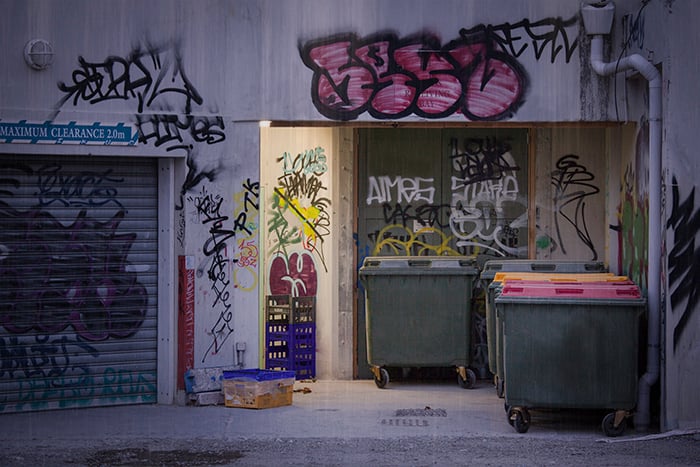
© Heather Milne
18. Empathize With Others
This is the most important to me. So much about street photography is about being sensitive to other people’s emotions, cultures, and privacy. My agenda is always to depict that life that is quirky, beautiful, and says something honest and meaningful about the subject.
There are plenty of moments when I’ve put my camera down during a street photography shoot. There are plenty of times when clicking the shutter was not appropriate.
Be clear about where your boundaries lie. And understand the ethics of photographing strangers. This will define your style and help you explain your processes to the people you photograph.
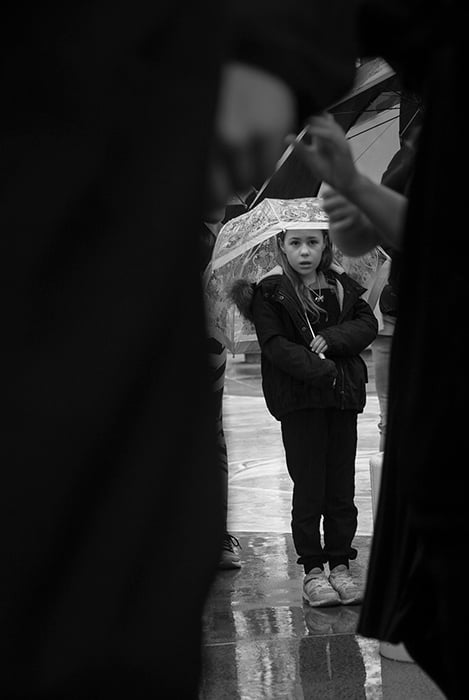
© Heather Milne
19. Take Some Street Portraits
Are you a street photography beginner and nervous about trying it? One of the best ways to get yourself comfortable is to take some street portraits. This will get you in the mood and will help you get used to photographing people.
Stop some people. Tell them you're doing a project and thought they looked great (flattery goes a long way). And offer to email them the photos. When you do this, don't just take one or two quick photos and run away. Try to take a good portrait of them.
Frame them right and think about the background. And most importantly, try to bring out and capture their personality. They will be thankful for the effort.

20. Create Descriptive Photos of Your Area
Take a few photos every day or every other day. Go back to the same locations over and over again, no matter where you are. The areas you spend a lot of time in are the areas you should be shooting! Even if you think they are boring areas for photography.
If you think an area is uninteresting for photography, that should be your reason to go there and photograph it. Photograph why you think it is boring. You may discover some surprising and interesting things about it in the process.
Whether people are present or not, try to capture the essence of the places you frequent. Try to get images that show what the area is really about and build portfolios of this over time.

Conclusion
Photographing the streets and people around you is a fantastic way to hone your observational skills. And you get to document the heritage and atmosphere of a city or town.
By incorporating some creative street photography techniques and ideas, you can make truly original photographs that grab peoples’ attention and are authentic to your street photography experiences.
Great street photos come around rarely, so you have to have patience and faith that they will happen. Learn to enjoy the walk.
Check out our Urban Smartphone Minimalism e-book to master capturing your environment!

